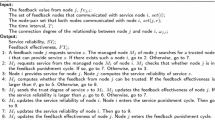Abstract
Trust models are widely used in various computer science disciplines. The primary purpose of a trust model is to continuously measure the trustworthiness of a set of entities based on their behaviors. In this article, the novel notion of rational trust modeling is introduced by bridging trust management and game theory. Note that trust models/reputation systems have been used in game theory (e.g., repeated games) for a long time, however, game theory has not been utilized in the process of trust model construction; this is the novelty of our approach. In our proposed setting, the designer of a trust model assumes that the players who intend to utilize the model are rational/selfish, i.e., they decide to become trustworthy or untrustworthy based on the utility that they can gain. In other words, the players are incentivized (or penalized) by the model itself to act properly. The problem of trust management can be then approached by game theoretical analyses and solution concepts such as Nash equilibrium. Although rationality might be built-in in some existing trust models, we intend to formalize the notion of rational trust modeling from the designer’s perspective. This approach will result in two fascinating outcomes. First of all, the designer of a trust model can incentivize trustworthiness in the first place by incorporating proper parameters into the trust function, which can be later utilized among selfish players in strategic trust-based interactions (e.g., e-commerce scenarios). Furthermore, using a rational trust model, we can prevent many well-known attacks on trust models. These two prominent properties also help us to predict the behavior of the players in subsequent steps by game theoretical analyses.
This research was supported by the Department of Defense (DoD) Research and Education Program, grant 72498-RT-REP.
Access this chapter
Tax calculation will be finalised at checkout
Purchases are for personal use only
Similar content being viewed by others
References
Castelfranchi, C., Falcone, R.: Principles of trust for MAS: cognitive anatomy, social importance, and quantification. In: 3rd International Conference on Multi Agent Systems, pp. 72–79. IEEE (1998)
Feng, R., Che, S., Wang, X., Wan, J.: An incentive mechanism based on game theory for trust management. Secur. Commun. Netw. 7(12), 2318–2325 (2014)
Harish, M., Mahalakshmi, G., Geetha, T.: Game theoretic model for P2P trust management. In: International Conference on Computational Intelligence and Multimedia Applications, vol. 1, pp. 564–566. IEEE (2007)
Jøsang, A., Ismail, R., Boyd, C.: A survey of trust and reputation systems for online service provision. Decis. Support Syst. 43(2), 618–644 (2007)
Kerr, R.: Addressing the issues of coalitions & collusion in multiagent systems. Ph.D. thesis, UWaterloo (2013)
Mailath, G., Samuelson, L.: Repeated Games and Reputations: Long-Run Relationships. Oxford University Press, Oxford (2006)
Mayer, R.C., Davis, J.H., Schoorman, F.D.: An integrative model of organizational trust. Acad. Manag. Rev. 20(3), 709–734 (1995)
Mui, L.: Computational models of trust and reputation: agents, evolutionary games, and social networks. Ph.D. thesis, Massachusetts Institute of Technology (2002)
Mui, L., Mohtashemi, M., Halberstadt, A.: Notions of reputation in multi-agents systems: a review. In: 1st ACM International Joint Conference on Autonomous Agents and Multiagent Systems, AAMAS 2002, pp. 280–287 (2002)
Nojoumian, M.: Novel secret sharing and commitment schemes for cryptographic applications. Ph.D. thesis, Department of Computer Science, UWaterloo, Canada (2012)
Nojoumian, M.: Trust, influence and reputation management based on human reasoning. In: 4th AAAI Workshop on Incentives and Trust in E-Communities, pp. 21–24 (2015)
Nojoumian, M., Lethbridge, T.C.: A new approach for the trust calculation in social networks. In: Filipe, J., Obaidat, M.S. (eds.) ICETE 2006. CCIS, vol. 9, pp. 64–77. Springer, Heidelberg (2008). https://doi.org/10.1007/978-3-540-70760-8_6
Nojoumian, M., Stinson, D.R.: Brief announcement: secret sharing based on the social behaviors of players. In: 29th ACM Symposium on Principles of Distributed Computing (PODC), pp. 239–240 (2010)
Nojoumian, M., Stinson, D.R.: Social secret sharing in cloud computing using a new trust function. In: 10th IEEE Annual International Conference on Privacy, Security and Trust (PST), pp. 161–167 (2012)
Nojoumian, M., Stinson, D.R.: Socio-rational secret sharing as a new direction in rational cryptography. In: Grossklags, J., Walrand, J. (eds.) GameSec 2012. LNCS, vol. 7638, pp. 18–37. Springer, Heidelberg (2012). https://doi.org/10.1007/978-3-642-34266-0_2
Nojoumian, M., Stinson, D.R., Grainger, M.: Unconditionally secure social secret sharing scheme. IET Inf. Secur. (IFS) Spec. Issue Multi-Agent Distrib. Inf. Secur. 4(4), 202–211 (2010)
Resnick, P., Kuwabara, K., Zeckhauser, R., Friedman, E.: Reputation systems: facilitating trust in internet interactions. Comm. ACM 43(12), 45–48 (2000)
Wang, Y., Singh, M.P.: Trust representation and aggregation in a distributed agent system. In: 21st National Conference on AI, AAAI 2006, pp. 1425–1430 (2006)
Wang, Y., Singh, M.P.: Formal trust model for multiagent systems. In: 20th International Joint Conference on Artificial Intelligence, IJCAI 2007, pp. 1551–1556 (2007)
Wang, Y., Singh, M.P.: Evidence-based trust: a mathematical model geared for multiagent systems. ACM Trans. Auto Adapt. Syst. 5(4), 1–28 (2010)
Author information
Authors and Affiliations
Corresponding author
Editor information
Editors and Affiliations
Rights and permissions
Copyright information
© 2018 Springer Nature Switzerland AG
About this paper
Cite this paper
Nojoumian, M. (2018). Rational Trust Modeling. In: Bushnell, L., Poovendran, R., Başar, T. (eds) Decision and Game Theory for Security. GameSec 2018. Lecture Notes in Computer Science(), vol 11199. Springer, Cham. https://doi.org/10.1007/978-3-030-01554-1_24
Download citation
DOI: https://doi.org/10.1007/978-3-030-01554-1_24
Published:
Publisher Name: Springer, Cham
Print ISBN: 978-3-030-01553-4
Online ISBN: 978-3-030-01554-1
eBook Packages: Computer ScienceComputer Science (R0)




